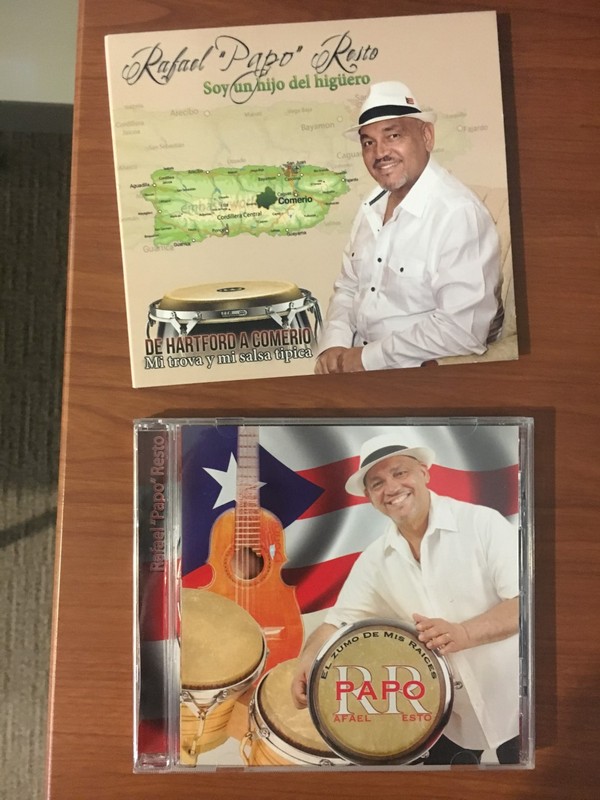Rafael Resto Music CD
Title
Subject
Singers—United States
Hispanic American singers
Folk music—United States
Plenas
Description
Puerto Rican music has several different types of music. The music stylings range from: classic, folk, bomba y plena, salsa, hip-hop and pop. Juan Flores book, From Bomba to Hip-hop: Puerto Rican Culture and Latino Identity, shows the transition from the traditional roots to the modern inclusion of Puerto Rican music to hip-hop, pop and reggae styles of today. The inclusion of Puerto Rican music into more mainstream music genres allow for a larger audience to experience Puerto Rican music. This also allows Puerto Ricans in America have a connection to both Puerto Rico and American culture. Bomba y Plena are the original traditional genres of Puerto Rican music created in Puerto Rico. Both Salsa and Pop are Americanized music genres that were created in the Puerto Ricans communities in New York. With migration to the United States beginning in the late 1950s and into the 1960s, Puerto Ricans felt racism. Music became a way of expression. Influenced by American rock music transforming bomba y plena into the salsa genre we know today. As author Frances R. Aparicio describes in Listening to Salsa: Gender, Latin Popular Music, and Puerto Rican Culture, “"While U.S. Rock and Roll allowed us to differentiate ourselves generationally from our parents....the Latin music constantly invited all in the audience to partake in the pleasures of familiar rhythms, melodies, and intimate romantic ballads to which our parents and grandparents had also sung and danced to during their youth." This combination of music styles allowed for a harmonious union of two different cultures as one. Salsa is upbeat music style that uses Cuban, African-Caribbean and Puerto Rican instruments and tones that. Popular in the United States due to its and highly danceable rhythm for parties, clubs or other opportunities. Since its creation in the United States it has since moved back to Puerto Rico making this the new epicenter. Pop stars such as Marc Anthony, Ricky Martin, Luis Foncsi and many others have allowed Puerto Rican pop music to become a success in both Puerto Rico and in America. This is a great exposure for non-Puerto Ricans to have a glimpse into Puerto Rican culture.
Music is used in many different ways in Puerto Rican communities. Family gatherings and festivals are a way to bring the community together and celebrate culture through food, music and dance. In the two cds, donated by Rafael and Lucy Resto reflects the traditional music still listened to Puerto Rico and the fusion style that exists because of emigration to the United States. In their interview, Rafael and Lucy Resto explain one of the uses of music in Puerto Rico. A three day festival is had where family and friends travel from across the island. People camp out, cook outside and play Puerto Rican traditional music to celebrate the family coming together. This represents how music can be used as a way to unite a culture through shared cultural identifiers such as food or music. Even now, Rafael and Lucy record Puerto Rican music in a studio in Windsor, Connecticut. They have their CDs available for sale to give others the opportunity to be reminded of their homeland or experience their culture for the first time.
Flores, Juan. From Bomba to Hip-hop: Puerto Rican Culture and Latino Identity. Popular Cultures, Everyday Lives. New York: Columbia University Press, 2000.
Glasser, Ruth. Aquí me quedo: Puerto Ricans in Connecticut. (Middletown, Conn.: Connecticut Humanities Council, 1997).
Glasser, Ruth. My Music Is My Flag: Puerto Rican Musicians and Their New York Communities, 1917-1940. Vol. [Pbk. ed., 1997]. Latinos in American Society and Culture. Berkeley, Calif: University of California Press, 1997.
Frances R. Aparicio, Listening to Salsa: Gender, Latin Popular Music, and Puerto Rican Culture. (London: Wesleyan Press, 1998).
“Puerto Rico: La Isla del Encanto: A Brief History”, www.umich.edu, access May 11, 2017, http://www.umich.edu/~ac213/student_projects06/dorir/puertorico.html.
Rafeal and Lucy (Puerto Rican History Harvest, New Britain, CT), interviewed by Morgan Bengal at Puerto Rican Society of New Britain, May 4, 2017.
Kenneth R. Gosselin, “Empty-Store Space In Hartford Area Equals Four Huge Malls”, Hartford Courant (Hartford, CT), September 2010.
Creator
Source
Publisher
Date
Accession Date: May 4, 2017
